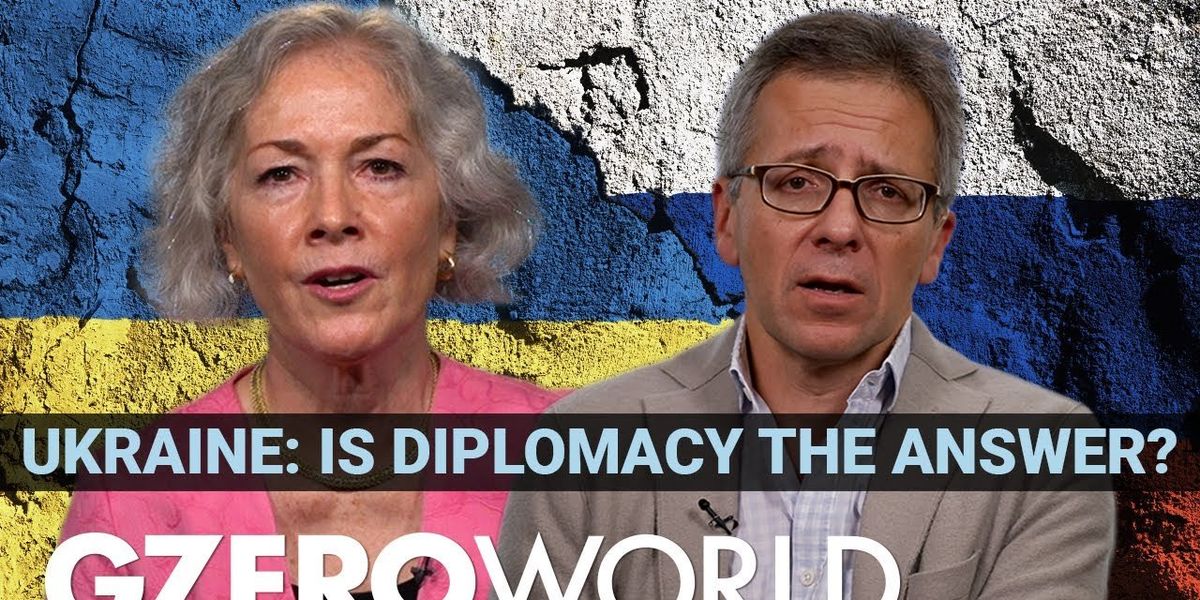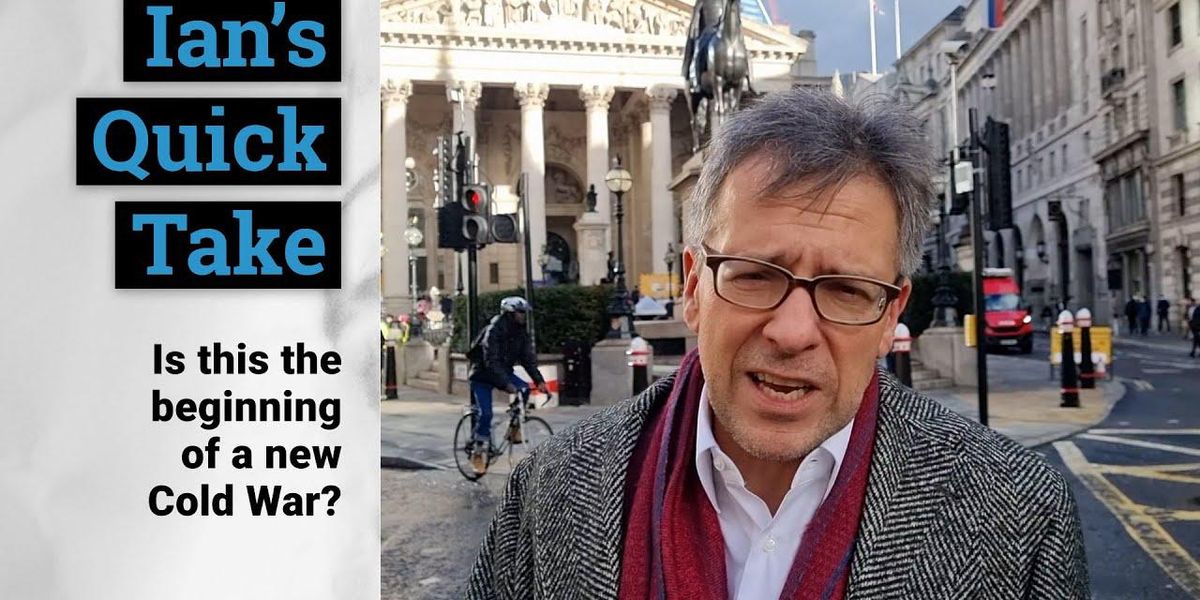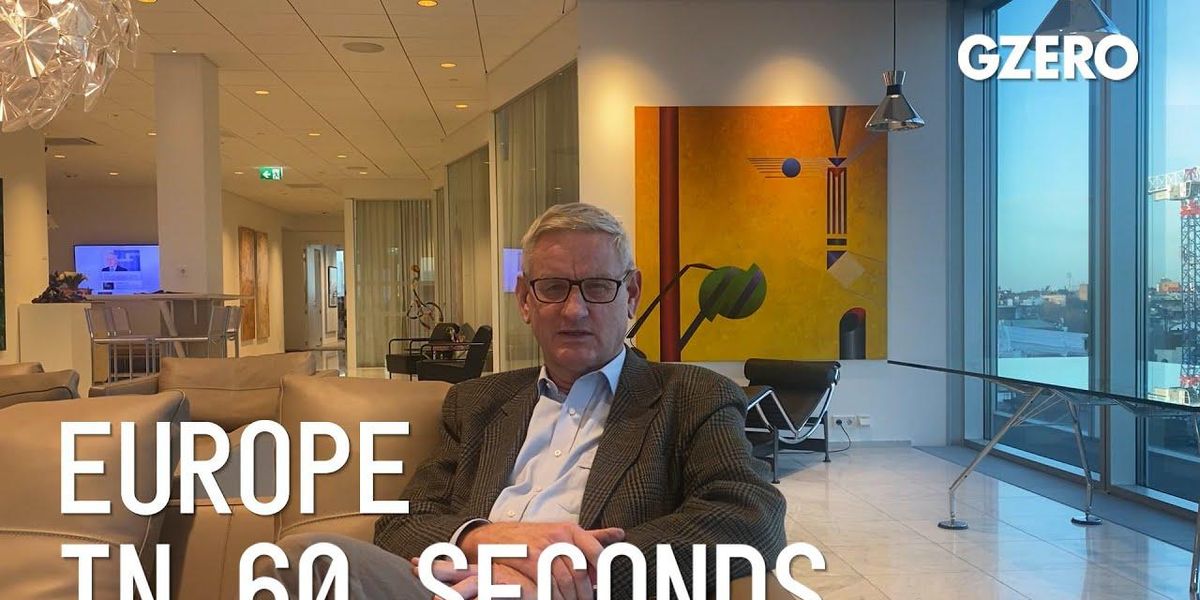Trending Now
We have updated our Privacy Policy and Terms of Use for Eurasia Group and its affiliates, including GZERO Media, to clarify the types of data we collect, how we collect it, how we use data and with whom we share data. By using our website you consent to our Terms and Conditions and Privacy Policy, including the transfer of your personal data to the United States from your country of residence, and our use of cookies described in our Cookie Policy.
{{ subpage.title }}
Russia-Ukraine War: Is a diplomatic solution possible?
It sounds almost naive to ask the question, but here it goes: can diplomacy end the war in Ukraine?
No one expects Putin to start playing ball, but might there be a way out of a war where there appears to be no end to the bloodletting and combat? Marie Yovanovitch, former US Ambassador to Ukraine, believes diplomacy must continue until the last vestige of hope is gone. Still, she doesn't think we should treat Russia with kid gloves while holding Ukraine's feet to the fire.
We must avoid a situation, Yovanovitch says, "where there's an agreement where the international community keeps on looking at Ukraine to do its part, but, you know, too hard to make Russia do its part, and so we don't pressure the Russians."
Yovanovitch joins Ian Bremmer for a wide-ranging interview about the state of Ukraine's counteroffensive and the war at large in the latest episode of GZERO World.
Watch this episode: Ukraine's counteroffensive on the brink
And watch GZERO World with Ian Bremmer every week on gzeromedia.com/gzeroworld and on US public television. Check local listings.
Russian troops into Donbas: Beginning of a new Cold War?
Ian Bremmer's Quick Take: Hi, everybody. Ian Bremmer here and right from the Bank of England, where we are looking at the beginning of a new Cold War between the United States, NATO, Europe, and Russia. It has indeed been an extraordinary momentous 24 hours. The Russians have decided they are going ahead to recognize the independence of the breakaway Ukrainian territories in the Donbas, sending in troops. Certainly, expected given where the Douma was heading and the statements from Putin over the last week. But nonetheless, this means diplomacy has failed between the United States, its allies and the Russians. It means sanctions are coming on to the Russians and the Russians are likely to respond and retaliate.
A couple things that are incredibly important here. The first is the Chinese response. The Chinese gave Putin the strongest possible support when he was in Beijing for the Olympics, in a joint statement made by Xi Jinping and President Putin. But since then, the Chinese have also made clear that they support a diplomatic resolution of Ukraine. They support Minsk negotiations going forward, and they supported the Ukrainian territorial integrity. Despite all of that, the Russians have basically just put a handout to the Chinese. They've said we are uninterested in supporting what you are promoting. And given that China is the most important by far a friend of Russia on the global stage among major powers, that's going to be immensely important to see how the Chinese respond here. If they decide they're really opposed to what the Russians are doing and willing to use their leverage with the Russians, keep in mind, you've got sanctions from the US and Europe. The Chinese are incredibly important, that could help bring a climb down. Short of that, we are in severely escalatory territory. We're going to see more sanctions, cyberattacks, which had been cut down by the Russians on critical infrastructure on the US, on other European countries, likely to return in very short order. And it's very hard to imagine with the end of the Nord Stream 2 pipeline that suddenly the Russians are going to take those kinds of costs on board and only take the occupied territories of the Donbas. You would expect they're going to go farther than that. And that would include taking territory that not only is Ukrainian, but that presently is occupied by Ukrainians. That means you start to see Ukrainians getting killed. It also means much more severe sanctions are coming on board. So, in escalatory mode as that occurs.
Getting incredibly dangerous, a changing global order in front of our eyes. NATO has never been as strong since the collapse of the Soviet Union, never been as important, but it's absolutely critical for all the countries of the Alliance they maintain that level of unity. And the ability to do that is going to be more challenging. The Russians aren't going to make it easy, making it easy for the Americans and NATO means full-on invasion. That would lead to much stronger alignment of everyone that, oh my God, the danger to the global order. But taking this incremental step makes it easier that countries like France or Italy, others, would peel off and say, no, we need to still work with the Russians. Find a way through, maybe not have as many tough sanctions as the Americans, the Brits, even the Germans are pushing for harder. So far that hasn't happened, so far Biden's done a solid job. So has Olaf Scholz, so even Emmanuel Macron, in maintaining a very strong and united front, that's the other thing to watch very carefully over the coming weeks.
For more of Ian Bremmer's weekly analyses, subscribe to his GZERO World newsletter at ianbremmer.bulletin.com
A militant of the self-proclaimed Luhansk People's Republic patrols the damaged building of a local school in the Luhansk region, Ukraine.
Setting Ukraine's rebels free?
The pace of Russia-Ukraine news is accelerating. Russian President Vladimir Putin says his troops are pulling back from the border, while Washington, NATO, and Kyiv say they’re not. Russia has expelled the deputy American ambassador from Moscow.
The week’s most ominous developments, however, center on the Donbas, the breakaway region of eastern Ukraine, where Russian-backed rebels and Ukrainian soldiers have been exchanging fire throughout the eight-year conflict. On Thursday, reports emerged that two schools, including a kindergarten, had been hit by shelling. Ukraine and Russia traded accusations over which side fired first, raising concerns that finger-pointing could lead to an escalation. Russia is “actively trying to provoke the Ukrainians into steps that would justify a Russian military intervention,” GZERO Media President Ian Bremmer said on Thursday in Germany ahead of the Munich Security Conference.
But there’s another Donbas development that reminds us of what Putin really wants – and signals what he might do next.
This week, Russia’s parliament voted to ask Putin to consider formal recognition of the independence of the two Donbas provinces, Donetsk and Luhansk. Ukrainian separatists there declared their independence in 2014, but no country, including Russia, has formally recognized them.
So far, Putin has resisted. He continues to insist that Ukraine honor the so-called Minsk Agreement, a peace plan that would leave the breakaway Donbas provinces as part of Ukraine – on condition they’re given “special status” and a degree of policy autonomy.
Compliance with the Minsk deal would force Ukraine’s government to rewrite its constitution. The new version would give governors of Donetsk and Luhansk – and, therefore, their sponsors in Moscow – the right to veto national security and trade policies approved by Ukraine’s national government.
In short, by keeping the Donbas provinces inside Ukraine, Putin could effectively block any Ukrainian entry into NATO or trade deals with the EU that ease Ukraine’s dependence on Russia. And it could achieve this without starting a war, suffering casualties, spending billions, or facing sanctions.
So, if Putin thinks the Donbas is useful for Russia as part of Ukraine, why did he allow Russia’s parliament to suggest formal recognition for Donbas independence? As Bremmer noted from Munich, “Suddenly, this week, it goes to the Kremlin for approval for that recognition. That’s a very significant move.”
Formal Russian recognition of the region’s independence would mark a major turning point in Putin’s Ukraine strategy, but it’s possible that Putin has decided he needs a face-saving way to avoid a costly war. He’d be declaring the Minsk deal dead, a sign of grudging acceptance that he can’t force Ukraine to embed Russian power into Ukraine’s constitution.
And maybe Putin has found another way to declare victory. The Russian government filed a report at the United Nations on Thursday alleging that Ukraine is guilty of “genocide of the Russian-speaking population” in the Donbas. Putin himself has made that charge repeatedly.
Accepting Donbas independence and offering public support for its leaders would score Putin points at home as the man who stopped a “genocide” and defended Russians abroad — and he could do that without going to war.
Putin could also be looking for an excuse to move many more Russian troops into the Donbas to intensify the military threat to Kyiv in hopes of winning the promise he wants that Ukraine will never join NATO.
The view from Kyiv
Some analysts argue that Ukraine should let the Donbas go. If those provinces were independent, there would be far fewer ethnic Russians left in the rest of Ukraine, and it would be much harder for Russia to manipulate Ukraine’s domestic politics.
But Zelensky has plenty of rivals at home who will call any concession to Moscow an act of cowardice and treason. Ukrainian troops still control about two-thirds of Donbas territory, though less than half its population. To withdraw them, ceding land that even Russia says is still part of Ukraine, remains politically impossible.
Putin appears to be weighing his options. But the possible Russian recognition of Donbas independence just became a story to watch closely.
Minsk agreement a path to resolving Ukraine crisis
Carl Bildt, former Prime Minister and Foreign Minister of Sweden, shares his perspective from Europe this week from Stockholm.
First, what's happening with the dispute with Russia?
Well, the Europeans, Paris and Berlin, are trying to revive the negotiations over the Donbas issue, the so-called Minsk format. I think that's a distinct sideshow, but of course, it would be good. But otherwise, we are waiting for the answer from Moscow, for the papers that were put on the table by Washington and by NATO, effectively rejecting most of the Russian demands, and they will see what happens thereafter.
Second question, who's going to fill the leadership vacuum in Europe?
Well, that remains to be seen, but for the moment, of course, France is in the presidency of the European Union, and President Macron is also very, very eager to show his European credentials when he's facing the tough re-election campaign in April. Then it will take some time for German Chancellor Scholz to establish himself firmly on the seat.
- Signs of Russian climbdown following Macron-Putin meeting ... ›
- Russia cares more about Ukraine than the US does - GZERO Media ›
- What would a Russian invasion of Ukraine actually look like ... ›
- “Crimea river”: Russia & Ukraine's water conflict - GZERO Media ›
- The EU's big Eastern problems - GZERO Media ›
- Russia's moves toward Ukraine - GZERO Media ›
- Russia-Ukraine: Diplomacy is still on the table - GZERO Media ›
- Russia-Ukraine crisis: Major escalation this week - GZERO Media ›


